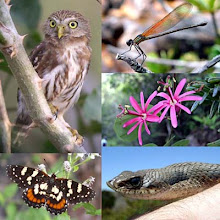April 29, 2013
I finally made it to the Danum Valley Field Centre tonight, despite some travel issues today. With only two weeks in Borneo, I had decided it was best to shave off travel time between cities by booking short internal flights, rather than taking the bus, though the latter is much cheaper. It turns out that would have been faster and a lot cheaper than I calculated after all.
I left the Mount Kinabalu Holiday Home in a shared taxi at 8:20 for the 90-minute ride back to Kota Kinbalu, got a quick taxi to the airport, and soon was notified that my noon flight to Lahad Datu was canceled--but no worries, I had alread been rebooked for the 3:50 flight, getting into Lahad Datu at 4:45. The problem is that the Field Center offers transfers (at a very high rate of about $22) only on Monday, Wednesday, and Friday, departing their office near the airport at 3:00. There is no public transportation option, and a private transfer for the two-hour ride is about $120. The Malaysian Airlines agent was very helpful in trying to solve the issue, calling the Field Centre twice and giving me a voucher for lunch until she heard back from her supervisor. But in the end, the option of losing two valuable days in the Danum Valley (to be filled with what and where and at what cost?) wasn't a viable one for me. So with the second phone call to the Field Centre, it was arranged that a Mr. Noh would meet me upon arrival at Lahad Datu in his black Toyota Hilux. And in the end, when I submit the form given to me by the agent and a copy of the receipt, Malaysian Airlines may actually reimburse me.
I had never even heard of it before starting to plan this trip, but Lahad Datu is a bustling city, a wealthy center of logging and palm oil production. Unfortunately, both have led to the utter distruction of unimaginable riches of biodiversity. Upon approaching the city, all I could see for miles and miles was African Oil Palm plantations. Please, please read the labels of the food you buy, and don't buy anything with palm oil. Otherwise there is Oruangutan blood on your hands (and you'll get atherosclerosis or something and die an early death). And I learned that Lahad Datu is also the world's Toyota Hilux capital of the world. I waved at four or five of them at the airport curb before Noh found me (it turns out they have a habit of adding "Mr." as a title before your first name--I was often referred to as Mr. Rich). Every fourth vehicle in the city's congested streets is a Hilux.
After stopping at grocery store for my field breakfast and lunch food for the next week (eggs to boil, carrots, peanuts, and sardines), it took us a half hour to escape the rush hour traffic before we were on the highway. It became dark not long after we turned onto a dirt road, and it was clear that we were entering a very humid area as water continually condensed on the outside of the Hilux's air-conditioned windows (the tropical models don't have defrost or heating of any kind). Despite the bad visibility, it was hard to miss the six Bornean Pygmy Elephants on the road. Noh had warned me that there had been a lot around, but the enormous piles of dung along a 15-kilometer stretch of the road was kind of a giveaway before we saw them.
After arriving at 7:40 p.m. and checking in at the Field Centre's reception and receiving a brief orientation, Noh drove me and my bags to the "hostel" (the shared dorm, the cheapest of the accommodations here, other than camping) and then to the dining hall where they kept dinner ready for me. I met two other travelers staying here, also staying at the hostel, Ingo from Germany (though living in Switzerland) and Anita from The Netherlands.
It turns out that the building lights here are pretty good for attracting interesting insects. Back at the kitchen building between the men's and women's dorms (a full half mile walk from the dining hall, I was unhappy to learn) were this beetle and two moths.









Goodness--those moths are spectacular!
ReplyDeleteLoved reading your blog but saddened by the description of the destruction of rainforest - I had my son on the phone from Borneo yesterday for half an hour terribly upset by the ecological disaster that is Borneo - he says most of the coral reefs are smashed and dead due to fishermen using dynamite! He could hear the blasts whilst he was diving.
ReplyDeleteNo wonder David Attenborough tells us all the world is overpopulated.